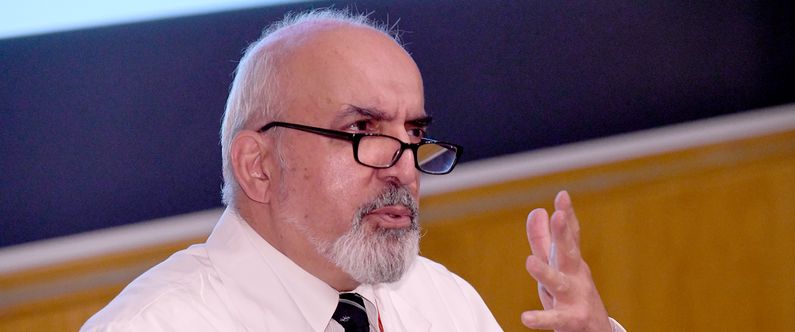WCM-Q Grand Rounds discusses food poisoning
 Dr. Mohamud Verjee of WCM-Q spoke about the cause, symptoms and treatment of food poisoning at WCM-Q Grand Rounds.
Dr. Mohamud Verjee of WCM-Q spoke about the cause, symptoms and treatment of food poisoning at WCM-Q Grand Rounds.
A leading family physician and professor explained the causes, symptoms, and treatment of food poisoning at the latest installment of Weill Cornell Medicine-Qatar’s (WCM-Q) Grand Rounds.
Dr. Mohamud Verjee, WCM-Q Associate Professor of Family Medicine in Clinical Medicine, Assistant Dean, Medical Student Affairs, and a Consultant Family Physician (PHCC), identified Salmonella, E. Coli, Campylobacteria, Listeria, Norovirus, and the anerobic Bacillus cereus as the six most common pathogens. He described the symptoms associated with food poisoning caused by each of them, the foods they affect, and the means of transmission. Other common pathogens that cause food poisoning include Clostridium botulinum, Rotavirus and Hepatitis A.
Dr. Verjee explained that while most sufferers of food poisoning recover relatively quickly, without causing lasting health problems, some types can be hazardous, particularly certain strains of bacteria. Symptoms of E. coli food poisoning emerge between one and eight days after exposure and symptoms include diarrhea, abdominal pain, fatigue, nausea and sometimes fever, and vomiting. E. coli bacteria are most commonly transmitted by drinking water contaminated with human or animal waste, and eating food such as partially cooked ground beef, unpasteurized milk, or fresh produce such as fruit and raw vegetables contaminated by irrigation and water run-off from agricultural areas. The identified and most dangerous strain of E. coli, O157:H7, produces a powerful toxin that damages the lining of the small intestine, a process known as colitis. This toxin leads to bloody diarrhea, before then being absorbed and carried to the kidney causing acute kidney injury (AKI), frequently resulting in renal failure, which may be fatal.
Dr. Verjee said: “E. coli O157:H7 is highly dangerous. The infection typically starts three to four days post-exposure and ultimately, can lead to post-diarrheal hemolytic uremic syndrome (HUS), which is abnormal destruction of red blood cells. It is a severe, life-threatening complication that occurs in about 10 percent of people infected with E. coli strain, and commonly found in incompletely cooked ground beef and beef burgers. Indeed, any meat, particularly poultry not cooked to the sufficient temperature is a potential health risk. I advise you all to be extremely careful when cooking poultry, red meat, or fish ensuring their cooking all the way through with no pink meat areas remaining.”
He then described the characteristics of other types of food poisoning before giving general pointers for management of the condition. He recommended against the use of anti-diarrheal medications, which are not recommended as they delay the body’s ability to rid itself of harmful pathogens. Instead, recovery involves drinking plenty of fresh water, eating bland, easy to digest foods restricting protein content, avoiding caffeinated drinks and dairy products, and resting adequately. To minimize the risk of food poisoning, Dr. Verjee recommended regular, “scrupulous hygiene with thorough handwashing, and personal care, mainly before food preparation, and defrosting frozen food properly at room temperature but not under a hot water tap wash. When roasting, place all uncooked meat in a pre-heated oven.” He advised the use of separate utensils and different preparation areas for meat, poultry, and fish, with no cross-contamination. Hairnets and facemasks are mandated by commercial companies when food is prepared and packaged. Further guidance advised drinking water only from trusted sources, especially when traveling abroad, and being careful of salads and other produce, which may be contaminated by infective agents such as the Hepatitis A virus.
The lecture was accredited locally by the Qatar Council for Healthcare Practitioners-Accreditation Department (QCHP-AD) and internationally by the Accreditation Council for Continuing Medical Education (ACCME).